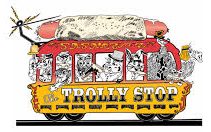
Our Client
Franklin Street’s Trolly Stop is predominantly a hot dog restaurant, with other locations based in Wrightsville Beach, Wilmington and Southport. Offering a traditional beef and pork dog, Trolly Stop also serves a gluten-free beef-only dog, a fat-free turkey dog and a vegetarian soy protein dog. With freshly made sides, a variety of condiments and their own, unique sauce, Trolly Stop has plenty to offer. Menu items like the “surfer dog” pay homage to the restaurant’s coastal beginnings, displaying a beachy theme at each of its locations. Located in Chapel Hill since 2014, Trolly Stop has been a welcome addition to Franklin Street.
The Problem
Trolley Stops’ Chapel Hill location struggled to tap into the student consumer-base, specifically using social media to connect. Between tough competition and an already established bar scene, it was difficult for Trolly Stop to solidify itself as a “go-to” restaurant.
The Strategy
The initial stages of our partnership included the creation of a monthly social media calendar, whereupon we would post Facebook and Instagram content on a nearly daily basis. Alongside the creation of written content, our multimedia team frequently visited the restaurant to gather photos of Trolly Stop and its food, which were also used in our social media calendars.
Social Media Deliverables











Key Insights
Nick Valego, the main campaign strategist on the Trolly Stop account, shed light on some of our plans for the restaurant.
“We wanted to create some kind of special theme night to try and compete with (other restaurants) in the bar scene,” he said. “We wanted to have a deal for the night where we discounted pitches of beer and some food with it, organized around a beach theme. We had really only started offering the pitcher discount when the pandemic hit, but we had even hoped to make custom cups for the pitchers.”
Additionally, we’ve explored the concept of hosting a hot dog eating contest amongst Greek students, an idea that was unable to come to fruition due to the global pandemic. This idea is still feasible however, and will likely be revisited at the appropriate time.
Results
Our work with Trolly Stop has certainly netted results, as was apparent by our first semester and January reports.
As of January, Trolly Stop’s social media following had grown, up nearly 100% in likes and page follows on Facebook. Trolly Stop’s Instagram following also saw a spike after a giveaway promotion we’d helped coordinate.
The end of our semesterly report in December indicated growth as well, suggesting Trolly Stop’s social media presence has seen continued improvement overtime. Our initial tests for the Monday bar special weren’t overly successful, but prior to the sudden impact of COVID-19, this was a relatively new experiment and we’d hoped for eventual improvement in attendance.
